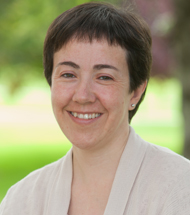"After the summer, family caregivers have the challenge to get back to the routine and combine it with caring for the sick person."
María Arantzamendi, researcher at the University of Navarra, directs a summer course in Basque on care in advanced and terminal illness.

PHOTO: Manuel Castells
"After the summer, family caregivers have the challenge to return to the routine and combine it with caring for their sick loved one". These are the words of María Arantzamendi, a researcher at the Institute for Culture and Society (ICS) of the University of Navarra, on the occasion of the summer course she is directing, 'Caring for and accompanying in advanced and terminal illness'. It will be given in Basque on September 12 and 13 at the Palacio del Condestable.
Professor Arantzamendi points out that families accompanying a family member with advanced disease devote more time during the summer period because of the freedom provided by the schedule summer and vacations. "The return means having to fit more pieces into the puzzle and to minimize personal costs the family relies on the resources available," she says.
Thus, she advocates sharing responsibilities between family and support networks: "Maybe others don't do things the way we like it best, or we think we can do it better. But it is important to let them participate in caregiving tasks. On the one hand, it involves them in this work and on the other hand, it avoids assuming it all among one or a few". In addition, she proposes a good organization among the participants.
Likewise, the expert recommends "determining a time of rest or respite", which "does not mean failing anyone". According to her, "rest makes it possible to feel better, to see status more clearly and to take care with less burden staff and more calm". On the other hand, he encourages "assessing the patient's status with the partnership of healthcare professionals and reviewing access to available social and healthcare resources".
A comfortable environment to express emotionsOne of the goals of the course is to create comfortable environments to talk about the emotions and challenges involved in the caregiving process. "In the program we will facilitate self-awareness and recognition of our emotions, which can be very intense and changeable. Everyone knows what to financial aid manage them: talking, exercising, listening to music, writing down what they feel...", she stresses. He reminds us that, in addition, "we can count on health professionals or associations.
Along with this, he stresses that positive aspects will be identified "that are sometimes blurred or lost from perspective", since "caring for a loved one is transformative, it can lead to a very valuable growth staff ". She says it is "an opportunity to share affection with the sick person and show gratitude for what they have given us over the years. In addition, small tokens of care or tasks you perform are remembered with affection and satisfaction and help in the grieving process".
The course will also feature the following speakers: Alazne Belar, nurse and predoctoral researcher of the ATLANTES Program of the ICS; Jaione Azparren, psychologist at the San Juan de Dios Hospital in Pamplona; and physician Iñaki Peña from the Alto Deba Hospital.
